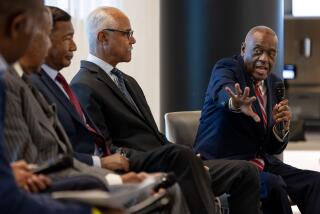Promise Keepers Steps Up Drive to Recruit More Minority Men
- Share via
When the African American chairman of Promise Keepers is asked how the nation’s fast-growing Christian men’s movement is doing in drawing men of color to its ranks, he winces at the recollection of his first meeting with the group’s white founder.
It was not, said Bishop Phillip H. Porter Jr., the most amicable of introductions in the summer of 1990.
Porter was incensed that founder Bill McCartney as head football coach at the University of Colorado had suspended a promising young black tailback and Heisman Trophy candidate from the team.
Porter believed the suspension stemmed from racism. McCartney was surprised and astounded by Porter’s anger and insisted that the team’s suspension policy applied to all players.
What followed was a dialogue that led to reconciliation and brotherly affection between the two men.
Porter was telling that story this week during his visit to Los Angeles--particularly at meetings with ministers of African American, Asian American and Latino churches--as Promise Keepers steps up its campaign to bring more men of color into its ministry.
The story, he said, points to both the problems and potential for healing that can occur when men of different races listen and pray with each other.
Porter’s foray into Southern California comes at a time when Promise Keepers is preparing for another mass rally here, this one May 2-3 at Los Angeles Memorial Coliseum. The organization hopes that more African Americans, Asian Americans and Latinos than ever will join what has been in the past a predominantly white audience.
*
‘We realize our call is to work with one man at a time,” Porter said during an interview this week. “God has called us to be leaders in a spiritual way. We change one man’s heart at a time, and he does another, and another.”
That’s what he says happened when he and McCartney first met seven years ago.
For weeks Porter and other black leaders in Colorado had been seething over McCartney’s decision at the time to suspend the young tailback from the team.
“We were talking about boycotting the University of Colorado--and Bill McCartney in particular,” Porter said.
As Porter tells the story, the player and some friends had put out a fire at the player’s mother’s house before the Fire Department arrived. When a fireman took an ax to a wall--despite the player’s protests that the fire already was out--the tailback tackled the firemen to prevent more damage. He was arrested on suspicion of assault.
Porter and other black leaders were outraged and saw the young man’s suspension as blatant racism. So Porter couldn’t wait to confront McCartney when he showed up at Porter’s church, All Nations Pentecostal Center, in the Denver suburb of Aurora.
Porter said the confrontation came to be a reconciliation for both men.
As it turned out the suspension policy applied to any player arrested, regardless of race. In this case the suspension was lifted after one game.
Nevertheless, Porter said, McCartney fell to his knees and begged Porter’s forgiveness when he realized that while the suspension policy covered all players, it often was African Americans who got arrested. And Porter, who initially had sought only vengeance and public embarrassment for McCartney, asked the coach to forgive him for automatically assuming that all whites were his enemy.
For the past several years, McCartney has been bothered by the fact that most of the hundreds of thousands of men who attend Promise Keepers rallies each year are white. He and others have been calling for racial reconciliation. Indeed, of the so-called “seven promises of a Promise Keeper,” the sixth commits men to “reaching beyond any racial and denominational barriers to demonstrate the power of biblical unity.”
That is easier said than done.
“It’s not moving like we’d like it to move,” said Porter, also a bishop of Montana for the Church of God in Christ, a predominantly African American denomination across the country. Racism in America is “systemic” and hard to root out, he said.
“It’s a painful thing at times for people to leave comfortable settings and come in,” Porter said. “But it’s also a needed one--and it’s one that will prove to be the better.”
*
Promise Keepers officials as recently as December said they may have tried too hard at a 1995 Los Angeles rally when participants were repeatedly urged to ask forgiveness of others for racism in the past. Some Caucasian men, attracted to Promise Keepers because of its emphasis on family values, were offended by the theme.
Porter said the message hasn’t changed, but the tactics have. Promise Keepers is now placing more emphasis on prayer.
“Men are beginning to pray and pour out their hearts so the Holy Spirit can truly have its way and change the hearts, not only of those who are the children and grandchildren of the oppressed, but those who are the children and grandchildren of those who have been the oppressors,” said Porter, who lives outside Denver.
“Each of us has to face the solo question for ourselves,” he said. “Mommy and Daddy cannot face it for us. We have to face the problem that America has dealt with since our inception--the problem of racism. None of us can skirt the issue. To try to skirt the issue and pass it off as if it doesn’t exist is to allow the problem to continue and get worse.”
Porter said he hopes that the example set by Promise Keepers at its national headquarters, where about 35% of the staff are African Americans or Latino, will serve as a model for the rank and file.


